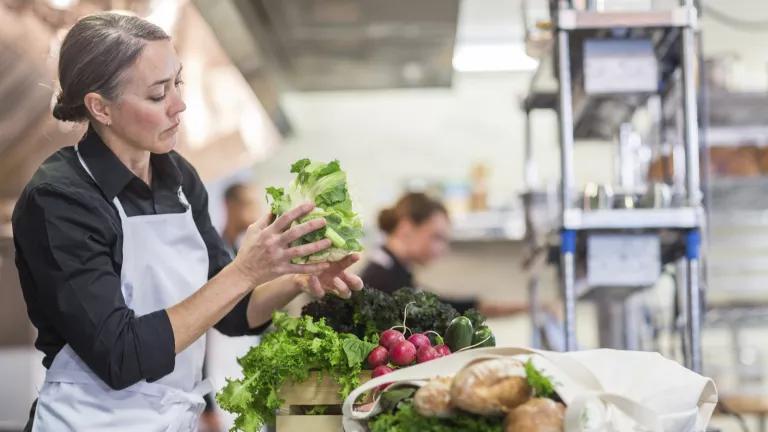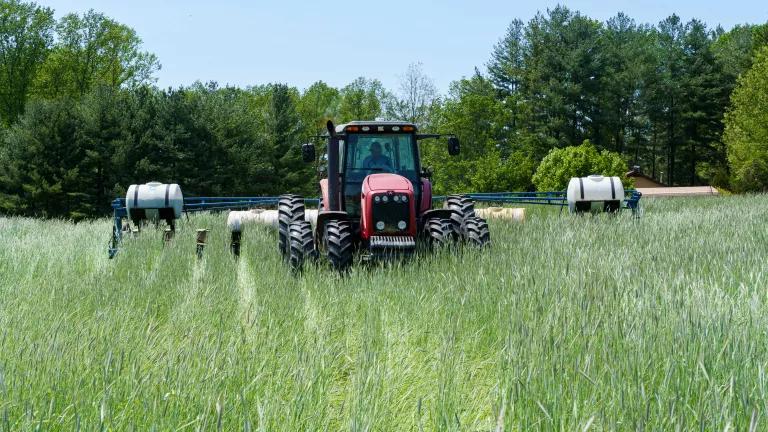2022 Wins in Food Waste & What’s Next in 2023
NRDC’s food waste team reflects on all we’ve accomplished this year and what we’re most excited for in 2023.

Photo: Food Matters Great Lakes Convening attendees at El Paseo Community Garden in Pilsen, Chicago
As the year comes to a close and we look forward to another, NRDC’s food waste team has reflected on all we’ve accomplished this year and what we’re most excited for in 2023. 2022 included renewed connections with our valued partners, unprecedented investment from the federal government, promising policy developments, and a long-awaited global recognition of the connection between food waste and climate change. This blog recaps some of the highlights of our year’s work, along with other key developments on the issue of food waste.
Regional and Municipal
Cities and counties continue to play a pivotal role in food waste reduction by implementing, piloting, scaling and sharing local solutions. NRDC’s Food Matters initiative, in which we partner with cities to achieve reductions in food waste through prevention, rescue, and recycling, saw incredible successes over the past year:
- In December, we marked the successful completion of our Food Matters Regional Initiative Mid-Atlantic and Southeast cohorts. In our second year of partnership, the ten Mid-Atlantic and Southeast cities participating in the initiative engaged over 525 food rescue stakeholders (organizations, donors, end users, etc.), received an estimated 6+ million views of messaging related to food waste prevention, hosted over 350 community events, collected or processed over 1,600 tons of food scraps, and conducted at least 25 food waste audits.
- The Food Matters Regional Initiative Great Lakes cohort of five cities, which will continue engagement through 2023, is accruing further accomplishments, including a greater role in climate conversations at the city level. For example, Chicago’s newly-released Climate Action Plan acknowledges the role that waste reduction plays in tackling the climate crisis and outlines the steps that the city will take to increase composting and reduce food waste – including through their participation in Food Matters.
- In partnership with the Environmental Law Institute, we released a new model ordinance on mandatory reporting for large food waste generators, an off-the-shelf, easily adaptable tool that can be used by municipalities to require large generators to measure and report on their food waste generation. In 2023, we will release Lead by Example and Pay as You Throw model policy tools for cities looking to pass impactful policies without reinventing the wheel. Are there other model policies we should draft? Let us know! (foodmatters@nrdc.org)
- Food Matters partner cities and organizations took the stage at conferences around the world, including SXSW, the ReFED Food Waste Solutions Summit, the WasteExpo Food Recovery Forum, the Milan Urban Food Policy Pact (MUFPP) Annual Gathering, and the C40 Global Mayor’s Summit. These platforms showcased our partners’ leadership on food waste reduction and highlighted the important role that cities have in tackling food waste reduction and climate change.
In 2023, NRDC will expand our work with cities across the U.S. on food waste reduction strategies, including providing technical assistance and support for the development and implementation of restaurant challenges, food waste strategic plans, health inspector engagement, and consumer behavior change messaging, while building out a robust knowledge sharing network through which cities will be able to participate in webinars, learning groups, convenings and strategic relationship building.
State
In 2022, Washington joined the ranks of states with holistic food waste reduction laws with the passage of HB1799, for which we testified in support. We hope 2023 will see more states enact similar laws. On the other side of the country, students in Virginia advocated to facilitate surplus food donation through a law to extend liability protections to food donations even if they are past the “best by” quality date. This progress on state food waste policy is critical to changing the landscape at both state and local levels. In 2023, a coalition of NRDC and partners (the group that authored the US Food Loss and Waste Action Plan and the Farm Bill report referenced below), will release a resource to support state food waste reduction policy.
Previously, NRDC released a dozen state policy inventories and gap analyses documenting existing policies and highlighting opportunities to bolster weak or nonexistent policies across ten food waste reduction categories. In 2023, a new report in this series, covering the state of Colorado, will be released.
Federal
Action on the federal level related to food waste reduction picked up in 2022 and we saw legislative progress, increased funding, and executive branch action. NRDC, in partnership with Harvard Law School Food Law & Policy Clinic, WWF, and ReFED, released “Opportunities to Reduce Food Waste in the 2023 Farm Bill.” The report provides recommendations across food waste prevention, surplus food rescue, food waste recycling, and coordinating activities, and is the basis of our advocacy for the inclusion of food waste policy in the 2023 Farm Bill. In this legislative session, many food waste-related bills were introduced or re-introduced, such as the Food Date Labeling Act and Food Donation Improvement Act, the latter of which garnered 48 bi-partisan co-sponsors in the house, demonstrating the incredible support for food waste reduction.
- The first tranche of funding from the Infrastructure Investment and Jobs Act (IIJA), to transform municipal solid waste and recycling, including food waste reduction, became available in November 2022. To ensure that food waste-related projects would be eligible for IIJA-funded grant programs, NRDC submitted two sets of comments (here and here) and was pleased to see the newly-available grant programs reflected our recommendations.
- The Inflation Reduction Act (IRA), a $300 billion package passed in 2022, is Congress’ strongest climate action to date to confront the climate crisis. It includes multiple pots of funding that could be used to reduce food waste, including $5 billion for Greenhouse Gas Planning and Implementation Grants. NRDC is advocating for food waste reduction projects to be eligible for funding.
- NRDC also submitted analysis to USDA during a public comment period that successfully advocated for compost to be eligible for a new fertilizer production grant program of $500 million.
The Biden Administration also demonstrated its leadership this year by hosting the White House Conference on Hunger, Health, and Nutrition. Food waste sits at the intersection of the focus areas of the conference and a handful of recommendations in the National Strategy, released at the conference, address wasted food.
The momentum generated in 2022 at the federal level will help us make more progress in the next year. We look forward to the administration continuing its leadership, working on policies like the Farm Bill (an opportunity which only arises every five years), and engaging other channels, like federal agencies, to provide more funding and support to state, local and tribal governments to tackle food waste.
Global
Organizations like NRDC have long advocated for food waste to be a central pillar in the global imperative around addressing climate change. This year, advocacy was finally taking hold on the global stage. The Intergovernmental Panel on Climate Change (IPCC) Sixth Assessment Report highlighted the double-edged role the food system plays in climate change—it is simultaneously a driver of dangerous changes to our climate and deeply vulnerable to climate change impacts. In addition, for the first time ever, at this year’s United Nations Climate Change Conference (COP), held in Egypt, food and its connection to climate change was in the spotlight, including a Food Systems and Agriculture Day as well as a Food Systems Pavilion.
Accomplishments in global networks dedicated to reducing food loss and waste, like the Champions 12.3 network, have also been growing, though more work is still needed. NRDC’s president and CEO, Manish Bapna, joined the Champions 12.3 network this year, marking our commitment to the network’s principles to Target Measure Act.
Looking Forward
In 2023, we must leverage the momentum seen in 2022 to advance food waste policies, legislation, and programs to shift the foundations of our currently wasteful, inequitable, and unhealthy food system. One exciting opportunity through which advocates, cities, and others interested in food waste reduction can learn more about the links between our broader food system and issues related to equity is NRDC’s Seed Series. We launched the Seed Series this past summer, introducing participants to key topics and issues in the world of discard studies, a growing, transdisciplinary field that centers how waste impacts our world. This 10-part webinar series, hosted by Jesi Taylor, serves as a point of departure for participants to learn more about how they can take steps in their own lives towards climate justice, anti-racism, and rethinking waste. We look forward to the next six installments of the series re-launching in February 2023. Visit our blog to learn more about the Seed Series, view recordings of prior installments, or register for upcoming webinars.








